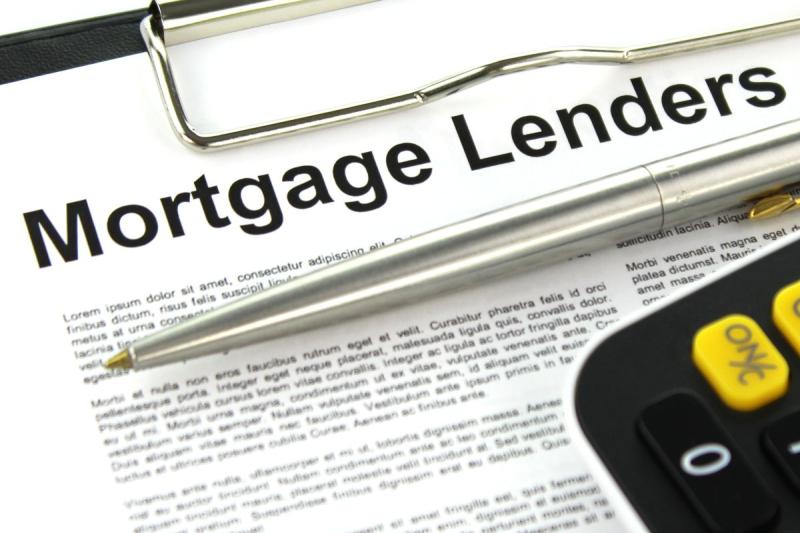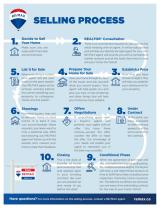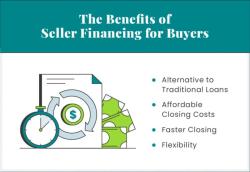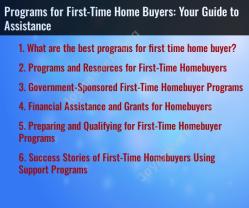Do any lenders offer mortgage downpayment assistance?
Yes, there are lenders and various programs that offer mortgage down payment assistance to help homebuyers with their upfront costs. These programs are designed to make homeownership more accessible, especially for those who may face challenges in accumulating a large down payment. Here are some common sources of mortgage down payment assistance:
Government Programs:
- Many government programs at the federal, state, and local levels offer down payment assistance. For example, the Federal Housing Administration (FHA) provides loans with lower down payment requirements, and some state housing finance agencies offer down payment assistance programs.
Local Housing Authorities:
- Local housing authorities or community development agencies may administer down payment assistance programs to encourage homeownership within specific regions.
Nonprofit Organizations:
- Various nonprofit organizations, both national and local, may offer down payment assistance grants or loans. These organizations aim to support affordable housing initiatives and help individuals and families become homeowners.
Employer Assistance Programs:
- Some employers partner with financial institutions to provide down payment assistance as part of their employee benefits. Check with your employer to see if such programs are available.
Banks and Credit Unions:
- Certain banks and credit unions have their own down payment assistance programs. These may include grants, low-interest loans, or other financial assistance options.
Community Development Financial Institutions (CDFIs):
- CDFIs are institutions that provide financial services in underserved communities. Some CDFIs offer down payment assistance programs to support community development and affordable housing.
Homebuyer Education Programs:
- Completing homebuyer education programs may make you eligible for down payment assistance. These programs often provide valuable information about the homebuying process and financial management.
Seller Concessions:
- In some cases, sellers may be willing to contribute to the buyer's closing costs or down payment as part of the negotiation process. This is known as seller concessions.
Down Payment Grants:
- Down payment grants are funds provided by various entities to assist with the down payment. These grants may be available based on income, location, or other eligibility criteria.
State Housing Finance Agencies:
- State Housing Finance Agencies (HFAs) often administer down payment assistance programs. These agencies aim to support affordable housing initiatives and may offer grants, loans, or other forms of assistance.
When seeking down payment assistance, it's essential to carefully review the terms and conditions of the programs, including any eligibility criteria, income limits, and repayment requirements. Additionally, working with a knowledgeable mortgage lender or housing counselor can help guide you through the process and identify suitable assistance programs based on your circumstances.
Navigating the Maze: Down Payment Assistance for Homebuyers
Purchasing a home is a major life goal, and the down payment can be a significant hurdle. Fortunately, numerous mortgage down payment assistance programs exist to help bridge the gap and make homeownership accessible to more people. Let's explore the options:
1. Lenders Offering Down Payment Assistance:
- Federal Government: The U.S. Department of Housing and Urban Development (HUD) offers various programs like FHA loans with lower down payment requirements (3.5% for qualified borrowers) and grants for specific populations.
- State and Local Agencies: Many states and localities offer down payment assistance programs for first-time homebuyers, low-to-moderate income individuals, or buyers in specific areas. Contact your state housing agency or local government for available programs.
- Non-Profit Organizations: Numerous non-profit organizations offer grant programs or low-interest loan options for down payments. Habitat for Humanity and NeighborWorks America are examples.
- Conventional Lenders: Some national and regional banks and mortgage lenders offer their own down payment assistance programs tailored to their client base and specific loan types.
2. Types of Down Payment Assistance:
- Grants: Free money that does not need to be repaid, often with specific eligibility requirements based on income, location, or purchase type.
- Forgivable Loans: Loans that are forgiven under certain conditions, like remaining in the home for a specific period.
- Second Loans: Low-interest loans that supplement the primary mortgage, covering part of the down payment.
- Down Payment Matching Programs: Some lenders match a portion of the borrower's down payment savings.
3. Impact on Homebuying and Affordability:
- Reduced Down Payment: Down payment assistance makes buying a home more attainable by lowering the upfront cost and potentially allowing access to lower mortgage rates.
- Increased Mortgage Amount: Depending on the program, assistance can allow for a larger mortgage, potentially opening up options for homes in preferred locations or with desired features.
- Potential Debt: Some programs involve loans that need to be repaid, adding to monthly expenses and impacting overall affordability. Consider carefully the long-term financial implications.
- Program Requirements: Programs often have specific eligibility criteria that may limit options for some buyers.
4. Eligibility Criteria:
- Income: Many programs have income limits for qualification, ensuring assistance goes to those who need it most.
- First-Time Homebuyer: Some programs are exclusive to first-time buyers, while others are open to repeat buyers under certain circumstances.
- Credit Score: While not always a primary factor, minimum credit score requirements may exist for loan-based programs.
- Location: Some programs target specific communities or revitalization zones.
- Property Type: Assistance might be limited to single-family homes or specific dwelling types.
5. When to Consider Assistance:
- Struggling to Save for Down Payment: If saving for a down payment seems impossible, assistance can be a game-changer in achieving homeownership.
- Qualifying for Program Criteria: If you meet the eligibility requirements of a suitable program, utilizing it can make a significant financial difference.
- Affordability Concerns: Consider the long-term financial impact of any loans involved and ensure the increased monthly payments remain manageable within your budget.
Remember, exploring down payment assistance options requires research and careful consideration. Compare programs, assess your financial situation, and consult with a mortgage professional to identify the best fit for your circumstances and make informed decisions towards achieving your homeownership dream.













